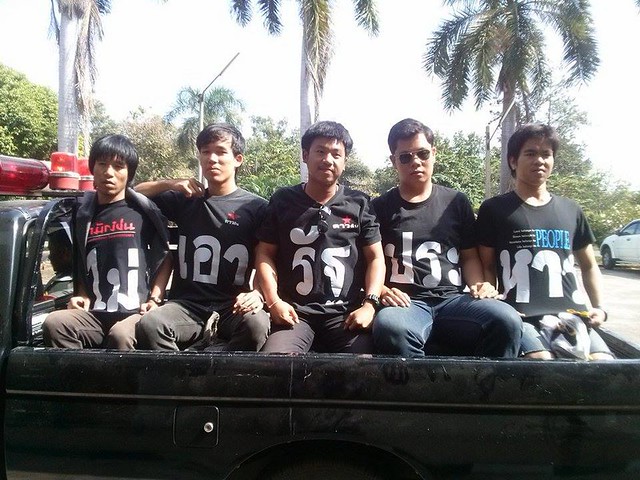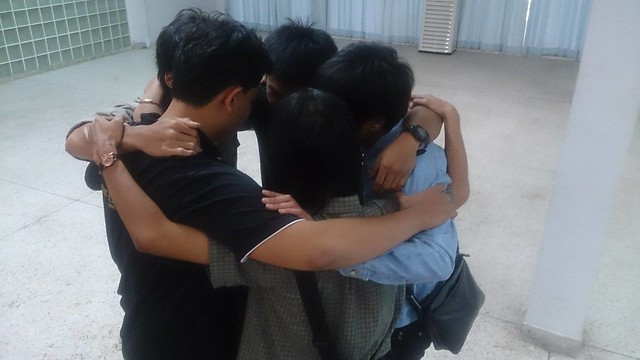On Wednesday morning five student activists from the Dao Din group at northeastern Khon Kaen University were arrested after they flashed the three-fingered salute, a dissent gesture adopted from the Hunger Games, as junta leader Gen Prayut Chan-o-cha visited Khon Kaen Province.
While Gen Prayut was giving a speech to civil servants at Khon Kaen Provincial Hall, the activists came and flashed the three-fingered salute and shouted “We’re against the coup.”
During their interrogation at Si Patcharin military camp in Khon Kaen, the military pressured the students to admit their 'guilt' and sign a document stating that they will not hold any further anti-coup activity. However, all of the students insisted they would not sign the document. The military then brought their parents in to pressure the students and threatened that if they do not sign the document, they will be dismissed from the university and officially charged.
At around 6.30 pm the military released the five activists but demanded that they come back with their parents on Thursday morning.
Prachatai interviewed Jatupat Boonpattararaksa, a fifth year student at Khon Kaen University's Faculty of Law, one of the five, on his goals for holding the activity, his experience at the camp and whether he will 'surrender' this morning.
We went [to protest against the coup on Wednesday] because today there are more and more human rights violations. We can't stand this anymore. Yes, they have told us to stop any activity. At that time it wasn’t a political activity. Our activity was related to the villagers. The point is, under these circumstances, we and the villagers cannot make any move.
They prohibit the villagers from speaking about the problems. They used martial law to suppress the villagers. The military have detained and confined the villagers. How could the problem be solved?
Therefore, when the Prime Minister visited [Isan], we had to highlight our goal: Lift martial law. We don't agree with the imposition of martial law because the law opens the door for violations of rights, liberty, rights to resources etc. We went there to take action. Also because the PM was visiting Isan for the first time so we think we must do something.
We talked and agreed that what the junta's National Council for Peace and Order (NCPO) does is to create a climate of fear . . . so we decided that at least our action will confirm that what the NCPO does is not right. If there's no opposition, it would look as if this coup and martial law is legitimate.
We did it because we're frustrated. Before we had the freedom to hold an activity anywhere we wanted. But today it's very difficult to make any move. We must tell the dictator that at least here there are some people who don't want that. We want to show to the world that there are many more people who disapprove of the coup, but they may not dare enough to show up.
What happened after you were detained?
We were taken to the criminal investigation department [at the police station]. We wrote down our names, faculties, etc. We were asked how we got here. Later we were taken to Si Patcharin military camp, there were two documents. The first one asked how we got there, where we got our t-shirts, how we got funding, what our political ideologies are, whether we faced any criminal charges, etc. The other is an agreement with the military, which we did not sign.
What are the conditions in that agreement?
The condition is that we will stop political activities. If we act, we agree to be arrested. We didn't sign because we believe what we did was right. If we signed, it would mean we obeyed this law, so we didn't sign. We explained to them that we didn't sign because it's against our conscience.
They said if we don't sign, the next step is to have the university remove our student status and have the police charge us. So now there are no charges. But when we were at the camp earlier, they said they would charge us for violating martial law.
Have they talked to the university?
They told us that they have talked and will have our student status removed. They added that the military has good ties with the university. Well, the rector is quite antagonistic toward us since we regularly rally against them on various issues, such as the privatization of the university.
At the camp, a military police officer and the chief of military staff talked with us softly. Later the head of the military intelligence unit interrogated us. They forced us to stand against the wall and admit to being guilty, but we didn't, we insisted that we'll accept [the consequences]. We argued that [martial] law is unjust and we can't accept that. Later, they became harsher. They gave us two choices: admit our guilt and be released or not admit it and get fired from the university.
All five chose the second choice. They forced us to take off our t-shirts, which we refused, so the military police took off our t-shirts.
After they used tough methods and it didn't work, they used our families to pressure us.
What did your families say?
All of our parents came to Khon Kaen. Some understand, some are very worried, some cried and some scolded us. In the end, one of us was pressured by his family into deciding to accept the military's conditions. The four others insist on fighting on and accept the consequences of dropping out of university.
Tomorrow, at 10 am at the camp, we'll go there and insist the same thing. They think we will change our minds after they brought our families in. We won't. They will have our parents sign a paper acknowledging the removal of our university student status.
Is there anything you want to tell society?
Follow your conscience. I believe many people know what is right and wrong. I don't think the NCPO can successfully brainwash people until they don't know what is right and wrong. I'd like to tell them that if you're frustrated, don't be afraid. Dictatorship fears people. It may be difficult to do something like this, but please just do it. It's something a human must do.
Everyone has the right to fear. But at the same time as we fear, we also have courage. I want everyone to do what they want. We did it today and found that there was nothing. We just walked there. It is up to us whether we are or are not afraid.
This is the era of young people, the new era where everyone helps setting the trend of our society and our country. Everyone should express their thoughts. I also have my thoughts and we should be allowed to exchange thoughts. The military should not force people to listen to them only.
We want you to fight.






